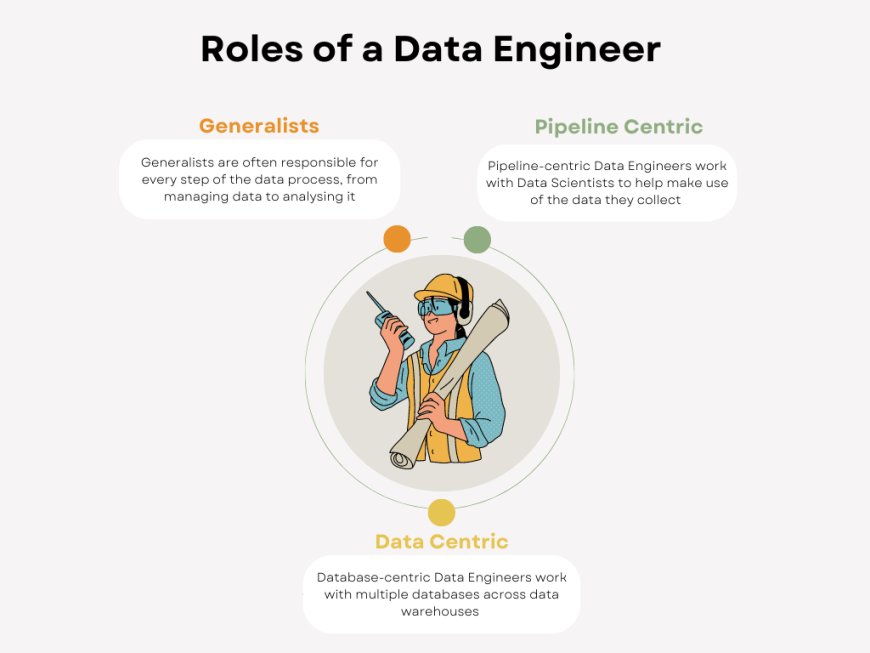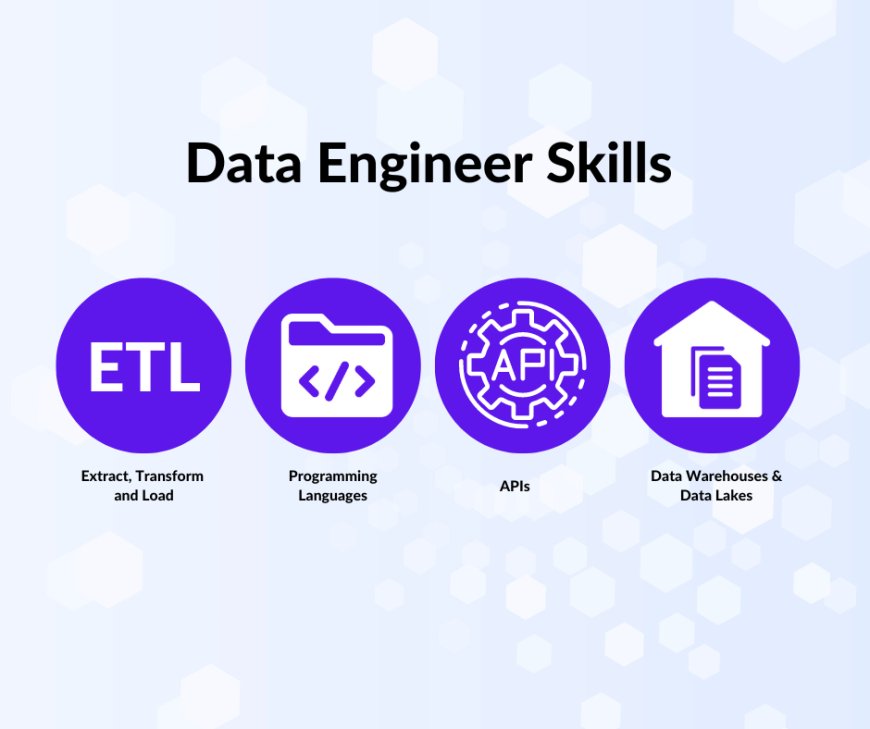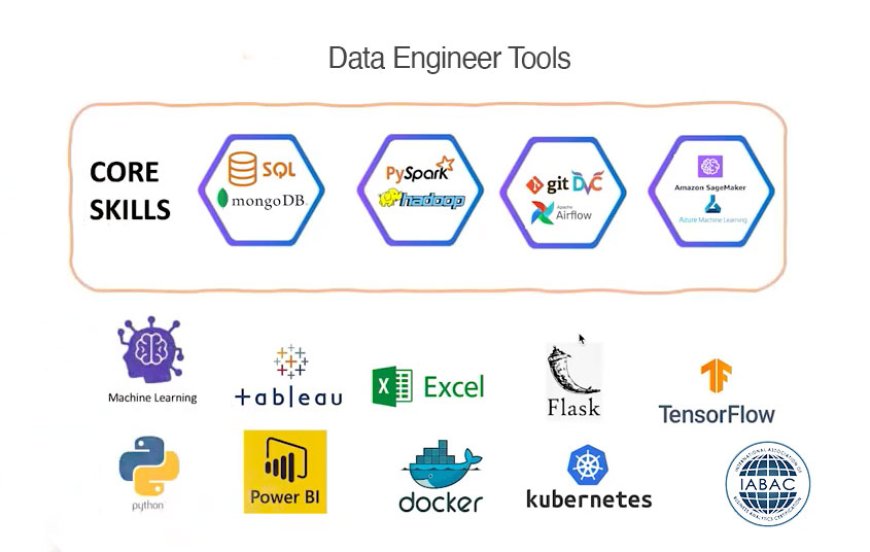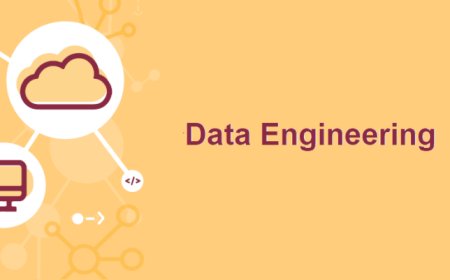If you've ever wondered about the magic behind how companies transform raw data into meaningful information, you're in for a treat. This complete guide on data engineering will help you understand the importance of data engineering, the tools, the skills needed to succeed in this field, and the exciting career opportunities awaiting you.

Data engineering is the backbone of any data-driven decision-making process. In today's digitized world, vast volumes of data are generated every second. To make sense of this data and leverage it for insightful decisions, we need data engineering. Data engineers are the unsung heroes who build the infrastructure and tools to gather, organize, and make the data usable.
Without data engineering, it would be nearly impossible to process big data or build data-driven applications. Data engineers take raw, unstructured data—like your endless scroll on a social media platform—and transform it into structured data that can be analyzed by data scientists or used by machine learning algorithms.
Understanding the Role of a Data Engineer

As a data engineer, your role involves a wide range of tasks that facilitate the smooth functioning of a company's data infrastructure. You would be responsible for:
-
Designing, constructing, installing, testing, and maintaining highly scalable data management systems: This includes ensuring all systems meet business requirements and industry practices.
-
Building high-performance algorithms, prototypes, and conceptual models: These tools help businesses forecast future trends and make data-driven decisions.
-
Translating complex functional and technical requirements into detailed architecture and design: This involves being able to take big picture ideas and break them down into detailed, workable parts.
-
Developing set processes for data mining, data modeling, and data production: The goal is to ensure the data is accessible and reliable.
Skills Needed to Become a Data Engineer

Data engineering isn't for everyone. It requires a unique blend of skills, including both soft skills like problem-solving and hard technical skills. Here are some of the most critical skills needed in this field:
-
SQL: As a data engineer, you must be proficient in SQL, the language used to communicate with and manipulate databases.
-
Data Warehousing Solutions: Understanding how to store and retrieve vast amounts of data is essential. Knowledge of systems like Redshift, BigQuery, or Snowflake can be beneficial.
-
Big Data Platforms: Proficiency in big data platforms like Hadoop or Spark is often required because these platforms can handle vast quantities of data.
-
ETL Tools: Extract, Transform, Load (ETL) tools are crucial for a data engineer's job. These tools take data from one database, transform it, and load it into another database.
-
Python and Java: Knowing programming languages like Python and Java can be beneficial, as many data engineering tasks involve coding.
-
Data Pipeline Frameworks: Tools like Apache Beam, Airflow, or Luigi help manage the data lifecycle, and data engineers need to be proficient with these.
-
Cloud Platforms: Most modern businesses store their data on cloud platforms, so knowledge of Amazon Web Services (AWS), Google Cloud Platform (GCP), or Microsoft Azure is essential.
Top Tools Used by Data Engineers

Data engineers have a wide array of tools at their disposal. Here are some of the most popular ones:
-
Hadoop: This open-source software framework allows for the distributed processing of large data sets across clusters of computers.
-
Spark: Apache Spark is a unified analytics engine for large-scale data processing. It's known for its speed and ease of use.
-
Kafka: Apache Kafka is a distributed event streaming platform that lets you publish, subscribe to, store, and process streams of records in real-time.
-
Airflow: Apache Airflow is a platform designed to programmatically author, schedule, and monitor workflows.
-
TensorFlow: TensorFlow is an open-source platform for machine learning. It has a comprehensive ecosystem of tools, libraries, and community resources.
Skills Required To Become A Data Engineering Professional
To become a data engineering professional, several key skills are essential for success in the field. First and foremost, a strong foundation in programming is crucial. Proficiency in languages like Python, Java, or Scala is important for data engineering tasks such as data extraction, transformation, and loading (ETL) processes.
Another essential skill is database knowledge. Familiarity with both relational databases like SQL and non-relational databases like MongoDB or Apache Cassandra is necessary for handling and manipulating large volumes of data efficiently.
Data warehousing concepts and tools are also important skills for data engineers. Understanding how to design and implement data warehouse architectures using technologies like Apache Hadoop, Apache Spark, or cloud-based platforms such as Amazon Redshift or Google BigQuery is vital.
Proficiency in data integration and ETL tools is essential for data engineers. Tools like Apache Kafka, Apache NiFi, or Talend enable the efficient movement and transformation of data between various sources and destinations.
Furthermore, knowledge of cloud computing platforms like AWS, Azure, or Google Cloud is increasingly valuable, as many organizations are adopting cloud-based solutions for their data infrastructure.
Data engineering professionals should also possess a good understanding of data modeling and schema design. This includes knowledge of data modeling techniques, database normalization, and designing efficient schemas to support data storage and retrieval.
Lastly, strong problem-solving and analytical skills are important for troubleshooting issues, optimizing performance, and ensuring data quality and integrity.By acquiring these skills, individuals can position themselves as competent data engineering professionals capable of handling the challenges and complexities of managing and processing large-scale data infrastructures effectively.
Various Domains Of Data Engineering
Data engineering encompasses various domains where data plays a critical role in decision-making and business operations. One prominent domain is Big Data engineering, which involves managing and processing large volumes of structured and unstructured data using distributed systems like Apache Hadoop or Apache Spark. Data warehousing is another domain, focusing on designing and building data storage and retrieval systems to support analytics and reporting. Real-time streaming and event processing domains involve capturing and processing data in real-time from sources like IoT devices or social media streams. Data integration and ETL (Extract, Transform, Load) is a key domain that focuses on extracting data from diverse sources, transforming it into a unified format, and loading it into target systems. Additionally, cloud data engineering involves leveraging cloud platforms for storing, processing, and analyzing data. Each of these domains requires specialized knowledge and skills to build robust and scalable data infrastructure and ensure efficient data processing and analysis.
How Is Data Engineering Is Different From Data Analytics
Data engineering and data analytics are two distinct but interconnected disciplines within the realm of data-driven decision-making. Data engineering primarily focuses on the design, development, and management of data infrastructure and systems that enable the collection, storage, and processing of data. Data engineers work on building and maintaining data pipelines, data warehouses, and data lakes, ensuring data is accessible, reliable, and available for analysis. They are responsible for data integration, data transformation, and ensuring the scalability and efficiency of data systems.
On the other hand, data analytics focuses on extracting insights, patterns, and trends from data to drive informed decision-making. Data analysts and data scientists work on analyzing data using statistical and analytical techniques, applying data mining and machine learning algorithms, and visualizing the findings. They leverage tools and programming languages to uncover meaningful insights and communicate them effectively to stakeholders.
While data engineering lays the foundation for data analytics by ensuring data is properly managed and accessible, data analytics focuses on extracting actionable insights from the available data. Data engineering involves building the infrastructure, pipelines, and systems that facilitate data analysis, while data analytics focuses on applying techniques to extract knowledge and drive decision-making.
Data engineering focuses on the infrastructure and systems required to handle data effectively, while data analytics concentrates on extracting insights from the data to inform business strategies and decisions. Both disciplines are interdependent and crucial components of a successful data-driven organization.
What Are The Prerequisites For Learning Data Engineering:
First and foremost, a strong foundation in programming is essential. Proficiency in languages like Python, Java, or Scala will enable you to write efficient and scalable code for data engineering tasks. Understanding concepts such as variables, data types, loops, conditional statements, and functions is crucial.
Knowledge of databases and SQL is another prerequisite for data engineering. Understanding how to work with relational databases and write SQL queries to extract, manipulate, and manage data is fundamental. Additionally, familiarity with non-relational databases and technologies like MongoDB or Apache Cassandra can be beneficial.
A basic understanding of data structures and algorithms is helpful for optimizing data processing and storage. It allows you to choose the right data structures and algorithms to handle large volumes of data effectively.
An understanding of distributed systems is also valuable. Concepts such as parallel processing, fault tolerance, and data partitioning are vital for designing and implementing scalable data engineering solutions.
Knowledge of cloud platforms and services like AWS, Azure, or Google Cloud is increasingly important, as many organizations are adopting cloud-based data solutions. Understanding how to work with cloud storage, compute resources, and data processing tools will be beneficial in the data engineering domain.
Lastly, having a strong analytical mindset and problem-solving skills will enable you to tackle complex data engineering challenges. Data engineering often involves optimizing performance, ensuring data quality, and handling data at scale. Being able to analyze problems, break them down into manageable components, and devise effective solutions is key.
While these prerequisites provide a foundation for learning data engineering, it's important to note that continuous learning, hands-on practice, and staying updated with emerging technologies and trends are crucial for success in this dynamic field.
What Is Machine Learning In Data Engineering
Machine learning in data engineering refers to the application of algorithms and techniques that enable data systems to automatically learn and improve from data without explicit programming instructions. It involves leveraging statistical models and algorithms to train data systems to recognize patterns, make predictions, and uncover insights from data. Machine learning techniques can be used in data engineering to enhance data processing, optimize data pipelines, automate decision-making processes, and improve the overall efficiency and effectiveness of data systems. By incorporating machine learning into data engineering practices, organizations can harness the power of data to drive intelligent decision-making and gain a competitive edge in various industries.
What Is The Syllabus Of Data Engineering
The syllabus for data engineering typically covers a range of topics aimed at equipping learners with the necessary skills to design, build, and manage data infrastructure. The syllabus commonly includes aspects such as programming languages like Python or Java, SQL and database management, data modeling and schema design, big data processing frameworks such as Apache Hadoop and Apache Spark, cloud-based data storage and processing using platforms like AWS or Azure, ETL (Extract, Transform, Load) processes, data warehousing concepts, data integration techniques, distributed systems, and optimization strategies for data processing. Additionally, topics like data quality, data governance, scalability, and data security may also be covered to ensure a comprehensive understanding of the field. The syllabus aims to provide learners with a strong foundation in data engineering principles and technologies, preparing them to tackle the challenges of managing and processing large-scale data systems effectively.
Data Engineering Career Opportunities
With the rise of big data, data engineering has seen significant growth. Companies from all industries and sizes are in need of talented data engineers to help manage and make sense of their data. Here are some career opportunities in this field:
-
Data Engineer: This is the most straightforward career path. As a data engineer, you'd be responsible for managing and organizing data, creating data architectures, and maintaining databases.
-
Machine Learning Engineer: With a background in data engineering, you could transition into a role as a machine learning engineer. Here, you'd be responsible for creating data funnels and delivering software solutions.
-
Data Architect: As a data architect, you'd create the blueprints for data management so that databases can be easily used and understood.
-
Business Intelligence Analyst: BI Analysts transform data into insights that drive business value. This role requires a deep understanding of data structures and the business sector in which you are working.
-
Database Manager: This role involves ensuring that a company's databases run efficiently and securely.
The world of data engineering offers a vast and varied field, with roles suited to a range of skills and interests. As data continues to take a central role in business, government, and society, data engineering will only grow in importance, making it an excellent field for those with the requisite passion and skills.
If you're interested in pursuing a career in data engineering, take the time to develop the skills discussed above. Be patient with yourself—it's a complicated field, and it takes time to learn. But if you're persistent and passionate, you'll find a world of opportunities waiting for you in the realm of data engineering.











































